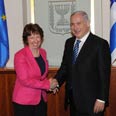
Powers drawing up framework for Mideast talks
EU representative Catherine Ashton says Palestinian President Mahmoud Abbas 'very close' to accepting direct peace talks with Israel, 'should be in position to give definitive answer by early next week'
Major powers are working on a statement to set the basis for direct peace talks between Israel and the Palestinians, the European Union's foreign policy chief told EU foreign ministers on Thursday.
High Representative Catherine Ashton said in a letter seen by Reuters the statement would be issued early next week, if both parties agreed to proceed to direct talks, and negotiations launched in August.
Palestinian President Mahmoud Abbas indicated on Monday he could go to direct talks, provided they were based on a March 19 statement by the Quartet.
Israeli newspapers said Prime Minister Benjamin Netanyahu told US envoy George Mitchell on Wednesday he wanted talks to start immediately without any such "precondition."
Ashton's letter said "Abbas is very close" to accepting direct talks. "In principle, President Abbas should be in a position to give a definitive answer by Sunday or early next week," it added.
Netanyahu's spokesman Mark Regev had no direct comment on the Israeli reports, which said Mitchell's mission to get both sides talking directly had failed over the Quartet proposal.
"The government of Israel has been calling for the immediate start of direct peace talks between Israelis and Palestinians for more than a year now," Regev told Reuters.
In Washington, State Department spokesman Mark Toner said Mitchell had held "good, productive meetings" in the region.
"We have confidence that we're moving in the right direction and ultimately will be successful," Toner said. "Is it difficult, yes. Are there issues, sure. But we're going to keep moving forward and we are moving forward."
A Western diplomat said Quartet officials were working on the language of a statement "inviting the parties to go back to direct negotiations" on the lines of the Quartet's position.
Abbas refuses to engage in direct talks unless Netanyahu agrees to a clear agenda. Without one, say the Palestinians, Netanyahu may propose terms for a peace treaty that are completely unacceptable, and leave Abbas looking like a rejectionist when he turns them down.
Rallying support
Indirect talks mediated by Mitchell have made no visible progress. Analysts say Abbas' credibility could be destroyed if Netanyahu engaged him in lengthy direct talks while making no concrete moves to end the Israeli occupation of the West Bank.
Ashton said the Quartet initiative "should help President Abbas rally enough support, both at home and abroad, to engage in direct talks."
The Quartet says Israel should halt settlement building in the West Bank and reach a full peace agreement with the Palestinians within 24 months, creating a state on the basis of the borders that existed before the 1967 war.
Ashton's letter made clear that these terms, contained in the Quartet's statement from Moscow on March 19, would form the basis of its statement "to be issued concurrently with the announcement of the launch of direct talks."
A Palestinian source close to negotiations said an agenda for the talks which speaks of a Palestinian state "on the basis of pre-1967 borders" could not be seen as an attempt to fix borders before negotiation.
"This language is what has been accepted in all the agreements over the past 18 years by Israeli prime ministers, including Netanyahu in his first term," he said.
- Follow Ynetnews on Facebook










